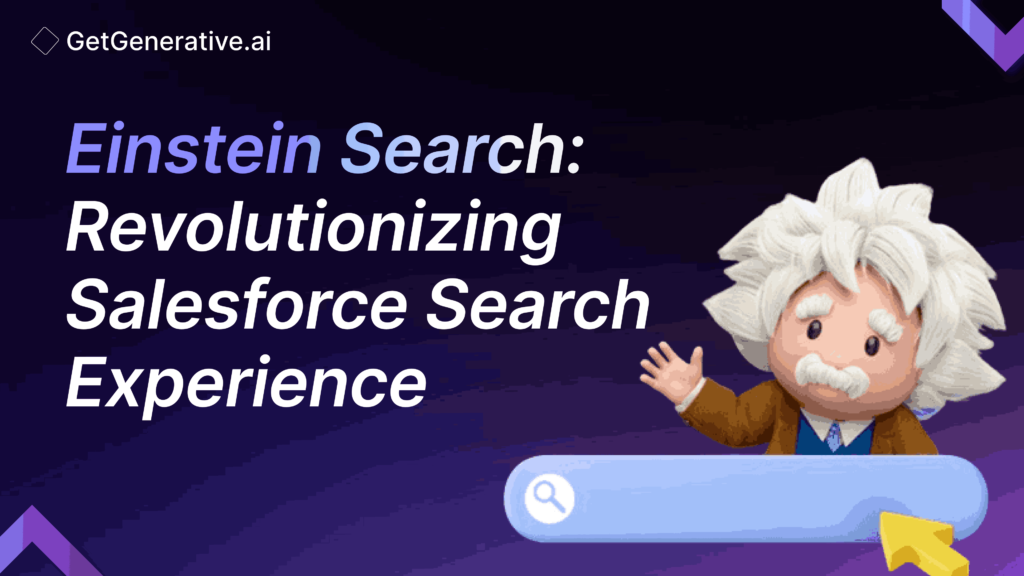Einstein Search: Revolutionizing Salesforce Search Experience
Quick access to relevant information is crucial for success in today’s fast-paced business world. According to a McKinsey report, employees spend an average of 1.8 hours every day searching and gathering information, which equates to 9.3 hours per week. Salesforce, the leading CRM platform, has introduced a game-changing feature called Einstein Search to address this challenge.
This powerful tool leverages artificial intelligence to provide users with more accurate and efficient search results, ultimately enhancing productivity and decision-making. A recent survey by Salesforce found that 73% of sales teams using AI have increased their productivity, while 63% reported improved conversion rates. This blog post will explore Einstein Search, its benefits, and how to configure it for optimal performance.
What is Einstein Search?
Einstein Search is an AI-powered search feature within Salesforce that enables users to find the information they need quickly and accurately. It is designed to understand natural language queries, making it easier for users to search for information using conversational language rather than specific keywords. Einstein Search is built on the Einstein Platform, a set of AI services, including natural language processing (NLP), machine learning, and deep learning.
One of the key features of Einstein Search is its ability to provide personalized search results based on a user’s role, history, and context. For example, if a sales representative searches for “top opportunities,” Einstein Search will consider their role, the accounts they work with, and their past interactions to provide a tailored list of the most relevant opportunities. This personalization is made possible by Einstein Search’s ability to analyze and learn from vast amounts of Salesforce data, including object fields, record types, and user activities.
How does Einstein Search work?
Einstein Search uses various AI technologies and analyzes massive amounts of Salesforce data to deliver highly relevant and personalized search results. Here’s a more detailed look at how Einstein Search works:
Natural Language Processing (NLP):
- Einstein Search uses advanced NLP techniques to understand the intent behind a user’s search query, even if it is phrased in conversational language.
- It breaks down the query into constituent parts, such as entities, actions, and context, to better comprehend the user’s information needs.
- NLP allows Einstein Search to handle complex queries, synonyms, and acronyms, making the search experience more intuitive and user-friendly.
Machine Learning and Deep Learning:
- Einstein Search employs machine learning algorithms to continuously learn from user interactions and feedback, improving search result relevance over time.
- It analyzes user behavior, such as which search results are clicked on and how long users spend on each result, to refine its understanding of the most valuable information to each user.
- Deep learning techniques enable Einstein Search to identify patterns and relationships between different data points, allowing it to make more accurate predictions and recommendations.
Personalization:
- Einstein Search considers a user’s role, history, and context to provide personalized search results tailored to their needs.
- It considers factors such as the user’s profile information, past search queries, records they have interacted with, and security settings to ensure that search results are relevant and accessible.
- Personalization helps users find the most important information quickly without sifting through irrelevant results.
Also Read – Einstein Prediction Builder: Empowering Salesforce With AI-Driven Insights
Salesforce Data Analysis:
- Einstein Search analyzes a wide range of Salesforce data, including standard and custom objects, fields, record types, and user activities.
- It indexes this data and uses it to build a comprehensive understanding of the relationships between different entities within the Salesforce org.
- By leveraging this wealth of data, Einstein Search can provide more accurate and comprehensive search results that consider the unique structure and content of each organization’s Salesforce instance.
Actionable Instant Results:
- Einstein Search provides actionable instant results, allowing users to act directly from the search results page.
- When a user searches for a contact, opportunity, or other record, Einstein Search displays key information about that record directly in the search results, such as phone numbers, email addresses, and record status.
- Users can click on these instant results to initiate actions, such as making a phone call, sending an email, or editing a record, without navigating to the record’s detail page.
Benefits of Einstein Search in Salesforce
- Improved search accuracy: Einstein Search delivers more precise results by understanding the intent behind the search query, reducing the time users spend sifting through irrelevant information.
- Increased productivity: With faster access to the right information, users can make informed decisions and take action more efficiently, ultimately boosting overall productivity.
- Enhanced user experience: Einstein Search offers a more intuitive and user-friendly search experience, making it easier for users to find what they need without extensive training.
- Personalized results: By considering a user’s role, past interactions, and search history, Einstein Search provides personalized results tailored to each individual’s needs.
Einstein Search vs. traditional search
Traditional search methods in Salesforce rely on keyword matching and often return a broad set of results, which can be time-consuming to navigate. In contrast, Einstein Search uses AI to understand the context and intent behind a query, delivering more accurate and relevant results. This approach significantly reduces users’ time searching for information, allowing them to focus on more valuable tasks.
How to enable Einstein Search
To enable Einstein Search in Salesforce, follow these steps:
- Navigate to Setup > Feature Settings > Search > Einstein Search.
- Click on the “Enable Einstein Search” button.
- Review and accept the terms and conditions.
- Click on the “Enable” button to activate Einstein Search.
Einstein Search best practices
To get the most out of Einstein Search, consider the following best practices:
- Encourage user adoption: Ensure that your team knows Einstein Search and its benefits, and provide training if necessary.
- Maintain data quality: Regularly clean and update your Salesforce data to ensure that Einstein Search has accurate information.
- Monitor search performance: Use the Einstein Search Feedback dashboard to track search performance and identify areas for improvement.
- Customize search layouts: Tailor search layouts display the most relevant information for each object, making it easier for users to find what they need.
How to configure Einstein Search for optimal performance
To ensure that Einstein Search delivers the best possible results for your organization, it’s important to configure it properly. Here are some key steps to optimize Einstein Search performance:
Identify and prioritize key objects:
- Determine which Salesforce objects, such as accounts, contacts, opportunities, or custom objects, are most critical for your users’ search needs.
- Prioritize these objects in the Einstein Search configuration settings to ensure they are more prominent in search results.
- Regularly review and update these prioritized objects as your organization’s needs evolve.
Customize search layouts:
- Customize the search layout for each object to display the most relevant fields and information.
- Include fields that users frequently search for or provide key contexts about the record, such as name, title, email, phone number, or status.
- You can use the “Einstein Search Fields” section in the object’s search layout settings to specify which fields should be used for Einstein Search indexing and relevancy ranking.
Also Read – Einstein Discovery: Salesforce AI Tool for Transformative Data Insights
Manage searchable fields:
- Review the fields available for each object and determine which ones should be searchable.
- By default, most standard fields are searchable, but you may need to enable searching for custom fields or limit searching for sensitive fields.
- You can use the “Searchable Fields” section in the object’s search layout settings to manage which fields are searchable and how they are indexed.
Set up synonyms:
- Identify common terms, acronyms, or aliases that users might use when searching for specific objects or records.
- Create synonym groups in the Einstein Search configuration settings to map these alternative terms to their standard counterparts.
- For example, you might create a synonym group that maps “NDA” to “Non-Disclosure Agreement” to ensure that users can find relevant records regardless of their terminology.
Train users on best practices:
- Provide training and resources to help users understand how to use Einstein Search effectively.
- Encourage users to use natural language queries and provide examples of constructing searches for common scenarios.
- Share best practices for refining searches, such as using filters or facets to narrow down results or using quotes for exact phrase matching.
Monitor and analyze search performance:
- Use the Einstein Search Feedback dashboard to track key metrics, such as search volume, click-through rates, and average click position.
- Identify low engagement or relevance searches and use this data to refine your search configurations or content.
- Regularly solicit user feedback on search quality and use this input to improve the search experience continuously.
Keep Salesforce data clean and up-to-date:
- Ensure your Salesforce data is accurate, complete, and up-to-date to provide the best search results.
- Regularly cleanse your data to remove duplicates, fix errors, and ensure consistency across fields and records.
- Encourage users to maintain high-quality data through training, documentation, and data validation rules.
Also Read – Salesforce Einstein Bots: Revolutionizing Customer Service With AI
Conclusion
Einstein Search is a powerful tool that revolutionizes how users find information within Salesforce. By leveraging AI and machine learning, Einstein Search delivers more accurate and relevant results, ultimately improving productivity and decision-making. By following best practices and configuring Einstein Search for optimal performance, organizations can unlock the full potential of this innovative feature.
Visit getgenerativeai.com to explore more about Salesforce and AI.
Frequently Asked Questions (FAQs)
1. Is Einstein Search available in all Salesforce editions?
Einstein Search is available in Enterprise, Performance, and Unlimited editions of Salesforce.
2. Does Einstein Search replace standard Salesforce search?
No, Einstein Search works alongside standard Salesforce search, providing additional intelligence and accuracy.
3. Is there an additional cost for using Einstein Search?
Einstein Search is included with compatible Salesforce editions at no additional cost.
4. Can Einstein Search be customized to fit an organization’s specific needs?
Einstein Search can be customized through search layouts, synonyms, and searchable object settings to better align with an organization’s requirements.
5. How long does it take for Einstein Search to learn and adapt to user behavior?
Einstein Search continuously learns and adapts based on user interactions and feedback. The more users interact with the search feature, the more accurate and personalized the results become.


